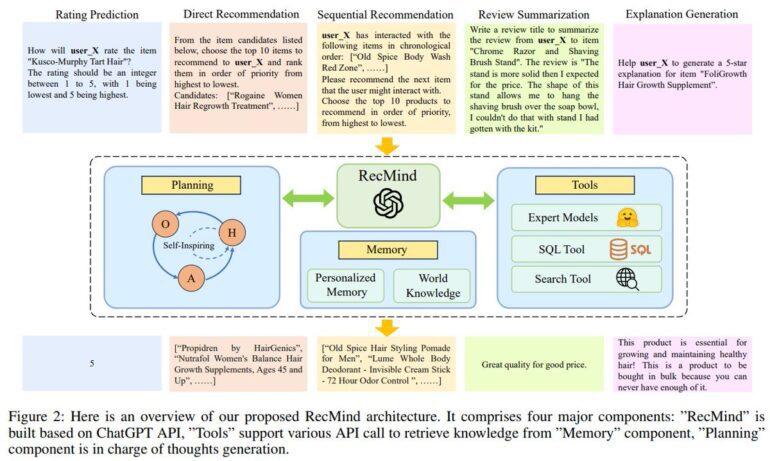TL;DR:
- The rise of AI and DNNs drives evolution of Recommender Systems across applications.
- RecMind leverages Large Language Models (LLMs) to revolutionize recommendation techniques.
- Self-Inspiring algorithm enhances RecMind’s planning ability using historical data.
- RecMind excels in diverse recommendation scenarios, outperforming existing methods.
- RecMind’s innovation signifies a paradigm shift in personalized, precise recommendations.
Main AI News:
In an era marked by the rapid rise of Artificial Intelligence and Deep Learning, the pervasiveness of AI across various applications is undeniable. The power of Deep Neural Networks (DNNs) has ushered in a new era for Recommender Systems, breathing life into their evolution. These systems play a pivotal role across diverse online platforms such as e-commerce websites, search engines, social media networks, and streaming services, redefining user engagement and experience through tailored suggestions.
Traditionally, recommender systems have undergone numerous algorithmic iterations, yet recent strides in technology have thrust Deep Neural Networks (DNNs) to the forefront. DNNs boast an unmatched prowess in deciphering intricate patterns and representations of user behaviors, enriching the quality of recommendations. However, this innovation brings forth certain constraints. Existing recommendation systems, built atop DNNs, including Convolutional Neural Networks (CNN), Long Short-Term Memory (LSTM), and influential pre-trained models like BERT, encounter hurdles in effectively assimilating textual insights about users and items. Furthermore, the majority of these systems are tailored to specific recommendation tasks, lacking adaptability to uncharted territories of recommendation diversity.
To surmount these challenges, a visionary team of researchers has introduced RecMind, an autonomous recommender agent fueled by the capabilities of Large Language Models. At its core, RecMind thrives on precision, harnessing strategic planning, external knowledge acquisition tools, and personalized data to curate pinpoint recommendations. A pivotal innovation embedded within RecMind is the Self-Inspiring algorithm, designed to elevate the planning prowess of the agent rooted in Large Language Models. Through “self-inspiration,” the LLM-infused agent dynamically integrates previously explored states during the decision-making process, thus enriching its ability to synthesize historical planning data for refined recommendations. This unprecedented feature sets the stage for a new era in recommendation systems.
The effectiveness of RecMind has been subjected to rigorous scrutiny across a spectrum of recommendation scenarios, encompassing:
- Rating Prediction – Forecasting consumer evaluations of specific entities.
- Sequential Recommendation – Orchestrating item suggestions in alignment with user preferences.
- Direct Recommendation – Facilitating direct and personalized item recommendations.
- Explanation Generation – Unveiling the rationale underpinning individualized recommendations.
- Review Summarization – Collating user feedback into concise summaries for specific products.
Upon meticulous evaluation, the research team unveiled compelling evidence showcasing RecMind’s superiority over prevailing zero and few-shot LLM-centric recommendation techniques across diverse task-oriented recommendations. Remarkably, RecMind even outperforms a recent contender named P5, which hinges on an exhaustive pre-training regimen meticulously tailored for recommendation endeavors.
Conclusion:
RecMind’s emergence as an autonomous recommender agent powered by Large Language Models represents a pivotal moment for the market. The integration of AI-driven strategic planning, self-inspiring algorithms, and personalized data curation signals a new era of recommendation systems. This breakthrough not only enhances user engagement and experience but also disrupts existing paradigms, prompting businesses to embrace advanced recommendation technologies to remain competitive and cater to evolving consumer demands.

